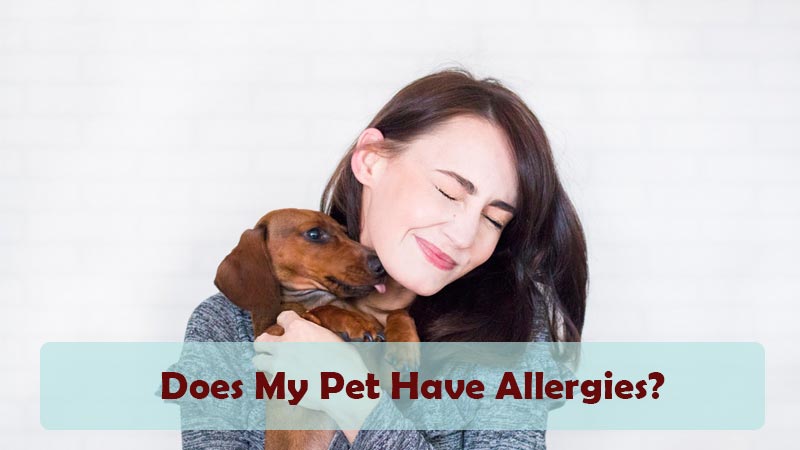
If you notice some signs of an allergic condition in your pet, remember that treating the symptoms is only a temporary fix, which can even be dangerous for the health of your pet. The first thing to do is to get an appointment with your vet as soon as you can.
Among controversial questions like ‘Are cats allergic to chocolate?’ or ‘Can dogs have an allergy to cat food?’, the question of the existence of such disease as the allergy in our pets is without any doubts these days. Yes, they can suffer the unpleasant and sometimes dangerous effects of allergies, as humans do.
Moreover, our little friends do need proper diagnostics and treatment, which can be effective only in case the allergen is identified and removed.
The biggest difficulty is that the allergen is usually an everyday substance, which is common in most environments and harmless to the majority of pets. Besides, often, pets are not born with allergies – they can suddenly become allergic to the specific food or substance they’ve been eating or contacting with since childhood.
So, if you notice changes in your pet’s behavior and wondering ‘does my cat has allergies?’, it’s definitely time to act!
Food Allergy
Food allergy is not so widely-spread: according to Canadian veterinarians, affects less than 10% of all cats and dogs and can show up at any age.
Cats are mostly allergic to:
-
- Beef
-
- Dairy
- Fish
Dogs are allergic to:
-
- Beef
-
- Dairy
-
- Wheat
-
- Lamb
-
- Chicken
-
- Eggs
- Soy
Main Signs of Food Allergies in Dogs & Cats:
-
- itchy or oozing skin
-
- chronic ear infections
-
- digestive disorders (gas, diarrhea, vomiting)
-
- irritated eyes
-
- swollen paws
-
- coughing & sneezing
- nasal discharge
If you notice the signs of food allergies in your dog or are worried because of your feline’s behavior and ask ‘Does my cat have allergies to some food?’, there are a number of ways to learn the source of the problem and solve it:
-
- For pets over 1-year-old, there’s a special Dr. Jean Dodds’ Nutriscan saliva test, which determines the allergy to corn, wheat, soy, beef, eggs, milk.
-
- If you feed your pet with the same food for years, change their diet completely. Pets need diversity in their diet like we do and sometimes develop an allergy to the routine food.
-
- Try a three-months allergy elimination diet to clear the allergic substances, detoxify, and clean out cellular debris.
- Add natural supplements to support the immune system of your pet after the elimination diet.
Flea Allergy
It’s a scientifically proven fact that flea saliva causes the allergic skin reaction in pets, which is called Flea Allergy Dermatitis (yes, it’s not the bite of the flea that causes the itching, it’s the saliva). FAD majorly affects dogs and cats over 6 months’ age, and usually can be diagnosed by such clinical signs:
-
- severe itching
-
- biting
-
- scratching
- hind end (especially at the base of the tail and inside the thighs)
Possible Complications
Fleas can transmit a type of tapeworm intestinal parasite. Thus, if your pet is suffering from the flea allergy, check its stool sample to make sure they’re not afflicted with this worm as well.
To control fleas in your pet:
-
- Bathe them often with a non-grain herbal shampoo: it helps to kill fleas and to heal skin irritations, relieving the general condition also using one of the best dog shampoos for Skin Allergies.
- Comb them regularly (at least once a day) with a flea comb and use the white cloth to see what’s being combed off.
Inhalant (Environmental) Allergy
Environmental allergy is probably the most common type in cats and dogs and can be genetically inherited. It is provoked by outdoor and indoor allergens – the same that affect humans too. Among the most popular inhalant allergens are:
-
- Grass, tree, and weed pollens
-
- Mold spores
-
- Dust
-
- Home-cleaning products
-
- Shampoo
-
- Smoke (from cigarettes)
-
- Feathers
-
- The smell of some food ingredients
-
- Perfumes
-
- Drugs
-
- Fabrics
-
- Plastic
- Rubber
Environmental Allergies Can Be SEASONABLE & YEAR-ROUND
Seasonable allergies occur during specific periods of the year and usually are the reaction to the temporary allergen that appears once in a year.
As for the second type, the allergen is present year-round, and usually, it’s an indoor substance like house dust.
Often, a seasonable allergy turns into a year-round if the proper treatment is not carried: year by year the pet becomes allergic to more and more things so that the condition gets awful and can even grow into asthma.
Here’s the list of obvious and simple things you can do to prevent environmental allergies in your pet:
-
- Clean your house regularly
-
- Don’t smoke around your pet
-
- Use non-toxic cleaning products
-
- Buy an air purifier for dust mites control
-
- Give only clean filtered water to your pet
-
- Be careful with medicines and vaccinations
- Bathe your pet regularly
Pets Allergic to People?
People blame house pets for breathing problems (allergies and asthmas) in humans, but the majority doesn’t imagine that this problem occurs in both ways!
Pets can be allergic to humans too (in particular, to human dandruff)!
Unfortunately, this type of pet allergies is not properly studied yet, so many vets can’t diagnose it, that leads to endless looking for an allergen. However, it’s still possible to identify the dandruff allergy in pets, so if you assume the possibility of this allergy type in your pet, insist on proper investigation of this issue.
Bottom Line
Not surprisingly, any type of pet allergies requires the specific treatment, but the first, easiest, and the most obvious step you should definitely take is to visit your veterinarian, who will conduct a physical examination, probably recommend skin and blood tests or a special elimination diet to identify the allergen. Remember that any allergy can have a severe complication, so don’t postpone the professional’s help as your pet’s health is a too high price to pay!

